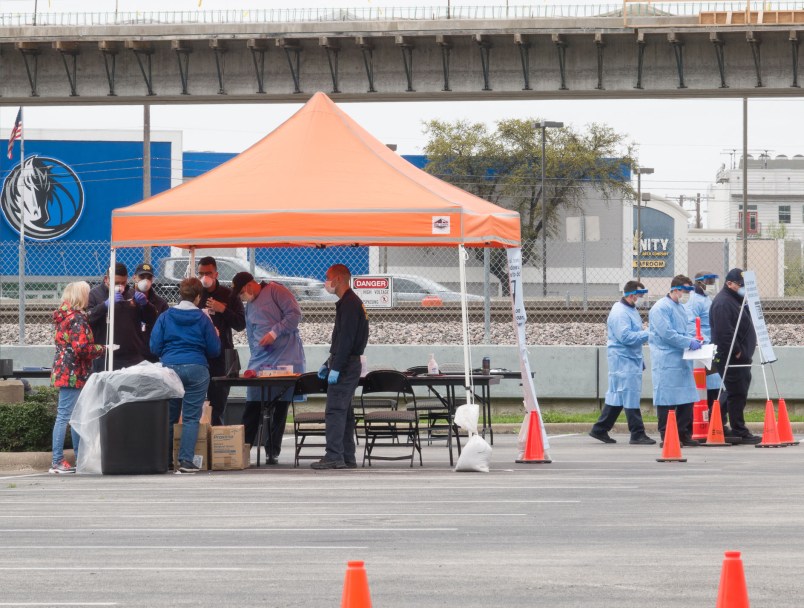States that received federal support for testing had to agree with a condition from the Trump administration: don’t ask for that help to be extended.
According to a letter provided to TPM by the Department of Health and Human Services, the State of Illinois received federal support for two testing sites in the state after agreeing not to ask for any further extensions on that support.
And, as agreed, those two sites are slated to close on June 30, 2020.
Craig Fugate, the FEMA administrator under President Obama, expressed surprise at the decision to TPM.
“It would seem to me as an observer that it’s a pretty dumb thing to turn off testing sites when cases are soaring over the issue of money,” he said. “All this is, this is money.”
HHS provided support for the community-based testing sites in the form of testing kits, personnel, and contracts for laboratories and patient notification.
TPM reported on Tuesday that the Trump administration is letting funding lapse for thirteen testing sites around the country at the end of the month, including seven in the virus-stricken state of Texas.
Officials in Pennsylvania told TPM that the closure of their site was subject to the same conditions, while a Colorado official told TPM that the state’s site “was set to expire at the end of June as part of” an earlier extension request.
Texas officials did not return repeated requests for comment on whether conditions were placed on their seven sites.
Fugate added that the language in the agreement conditioning aid on no further requests itself is not necessarily unusual. Rather, he said that the Trump administration’s refusal to grant an extension is puzzling. “Nobody says they can’t be extended unless there’s a statute stopping the extension,” he said.
He gave the example of people displaced by Hurricane Katrina. In that case, families affected by the hurricane had continued to receive federal-sponsored state housing aid for years after the catastrophe under agreements that contained similar language, Fugate said.
The point of the language in that case, he said, was to spur the state towards a solution, not to give the federal government a way to unilaterally withdraw.
“Our approach was to eliminate the need for temporary housing,” he added. “Once we got down to smaller numbers, we started doing casework with individual families.”
HHS has argued that the lapse in support marks a “transition” to state control of the sites, along with a separate program aimed at spurring pharmacy chains to provide free testing.
The thirteen sites to lose funding, HHS Assistant Secretary for Health Brett Giroir has said, are “antiquated” and “inefficient,” and therefore need to be transitioned to state control.
Sara Rosenbaum, a professor of Health Law at George Washington University, expressed puzzlement at the need to sunset the provision of federal aid.
“There is nothing inherent in the appropriation language that I’m aware of that says once a state gets testing money or support, that’s it,” she told TPM.
“So why the Trump administration would have put that kind of restriction on the acceptance of an award, I cannot even remotely figure out,” she added.
Fugate, the former FEMA director, added that “this is all about the money.”
“When the agreement was made, the thinking was this will be over by the time we get to summer, and this will be shifting back to primary state responsibility,” Fugate said.
Blaire Bryant, Associate Legislative Director for Health at the National Association of Counties, told TPM that the restriction appeared unusual in part because of the budget crunch on local government wrought by the COVID-19 pandemic.
“Most of these sites have been on their own with funding and have mostly relied on getting funding from the local government in their state,” Bryant said.
She added that money that states are expected to rely on to replace the lost federal support — from the CARES Act — was already largely being used to fill gaps in the budget created by the pandemic itself.
“There’s no direct line to fund public heath — money can go directly to hospitals, to government entities, etc,” she said. “And so what we’re seeing is a lot of the money being used to fill gaps and not being directed towards public health.”
Read the Illinois letter here:







They can’t ask for extension. They signed an NDA.
Fed support for testing Trump should also come to an end.
That way the hoax will end.
Chiselin’ Trump: “That makes me smart.”
You’re right. That’s how this freak thinks.
The Trump toadies guessed wrong, and microbiology didn’t give a damn about magical GOP thinking.
So now we just let tens of thousands needlessly die?
(NRA: “I just can’t compete with this kind of slaughter!”)